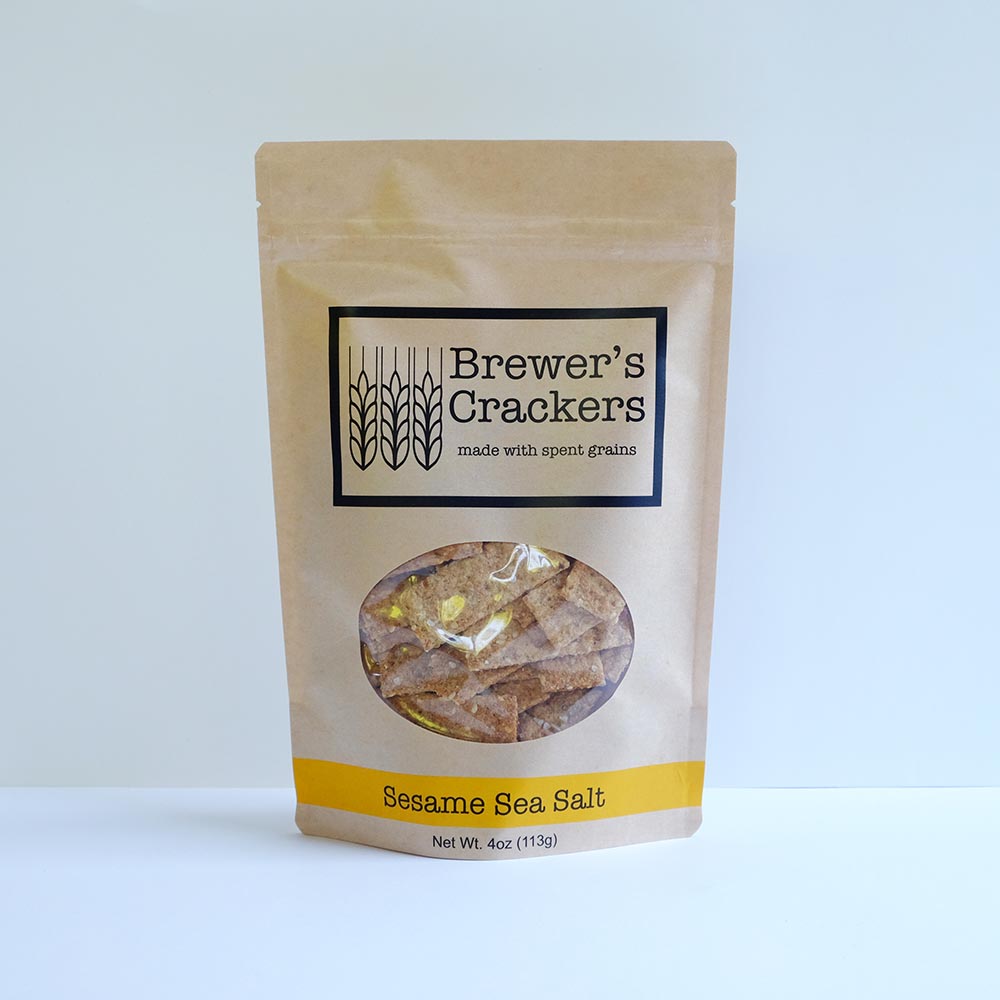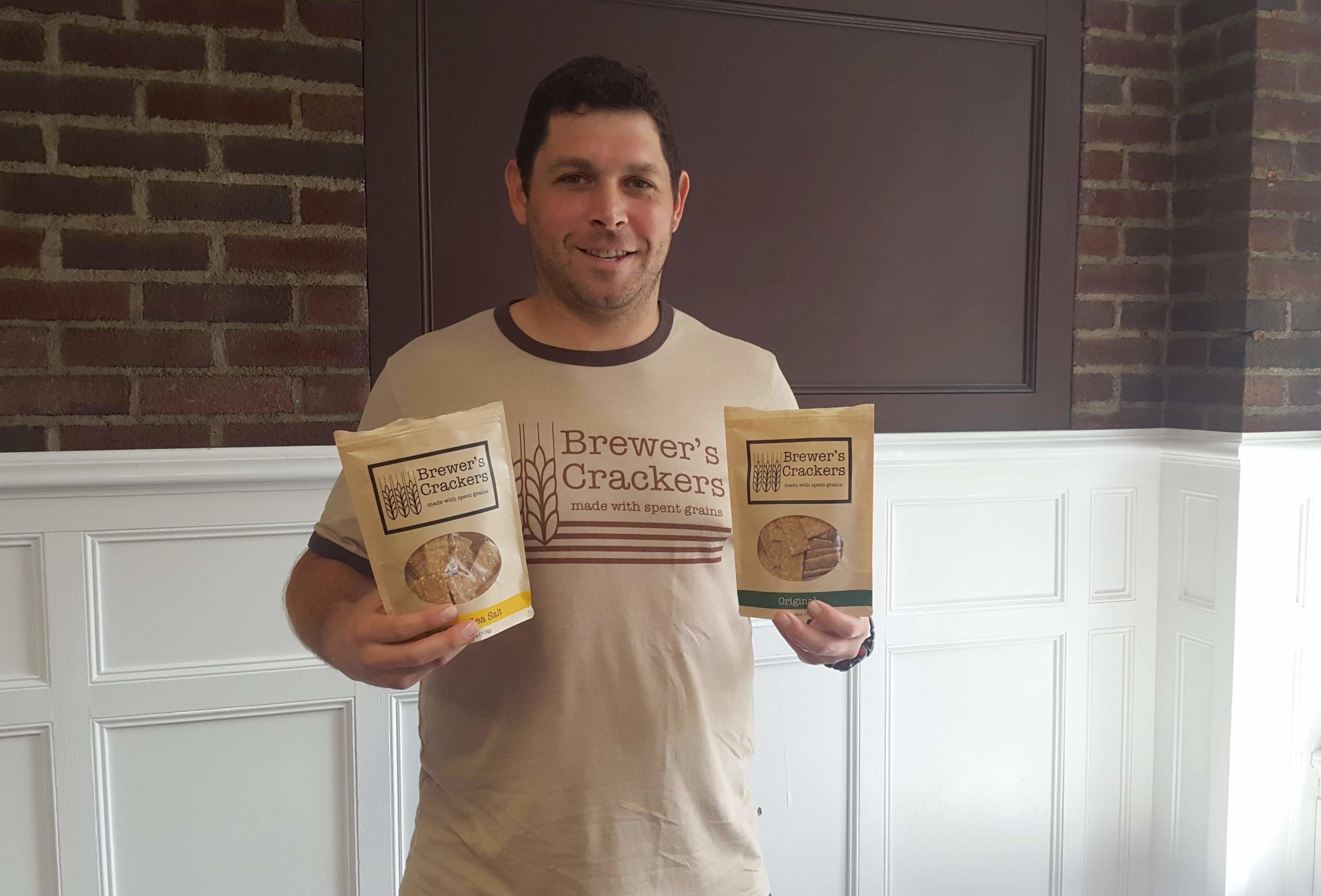About 15 percent of the grain used in beer production ends up in the beer, so Kyle Fiasconaro decided to experiment with the byproduct and see what he could make.
Eventually he settled on a cracker, and those Brewer’s Crackers are now hitting local specialty supermarkets, thanks to the help from his brother, Matthew Fiasconaro, who lives in Roslyn Heights.
The brothers in business, one in Massachusetts and one on Long Island, also distribute the crackers at Whole Foods stores from Northern Connecticut to Maine. A new deal means the crackers will soon be found at locations in New Jersey and New York, Matthew Fiasconaro said.
“Anything we can stop from getting into a landfill is a huge win,” he said.
Craft breweries compete with each other and mainstream beers by sourcing high-quality, unique grains from around the world, Matthew Fiasconaro said. That means the grains they send to landfills are higher-end than those found in most crackers, he said.

Waste plagues the food industry, and these crackers are one way of repurposing it, the co-founder said.
Brewer’s Crackers partners with a craft brewery in Burlington, Vt., to collect spent grains. Kyle manages production and Matthew handles the finances and marketing.
The brothers grew up in Commack, two of four children of a bagel store owner. With their parents busy working at full-time jobs, the kids cooked for themselves, Fiasconaro said.
“We would make dinner at night, my sister and myself,” he said. “If we wanted to eat, we would make it.”
Having a food-oriented entrepreneur for a father had a different impact on Kyle and Matthew. Kyle headed to culinary school and Matthew pursued business.
Kyle Fiasconaro quickly rose in the ranks of the cooking world, making it to the U.S. finals of the most prestigious international cooking competition, Bocuse d’Or. He worked for top New York restaurants, including Blue Hill at Stone Barns and Jedediah Hawkins, and later created a business foraging ingredients that he distributed to high-end restaurants.
While biking on Eastern Long Island, he witnessed grain waste from beer production and wanted to do something with it, perhaps inspired by their grandmother, Matthew Fiasconaro said. She was thrifty and composted food scraps in her garden.
“Kyle really has taken on that mentality,” he said.
After settling on a cracker recipe, Kyle Fiasconaro, a resident of Massachusetts, made a deal with a nearby brewery and started selling the crackers in local markets. In February, Whole Foods took an interest.
“When that happened, when Whole Foods called him, he had to really kind of ramp up production,” Matthew Fiasconaro said.
Around that time, Matthew Fiasconaro offered to help with the finances. It wasn’t until his brother sent him business cards that he knew he was officially a co-owner.
Now, he brings lessons from the company into his Syosset High School classrooms, where he teaches accounting and virtual entrepreneurship, and he hand delivers to stores like Iavarone Bros. and Holiday Farms.
In 2015, more than 30 million tons of food waste ended up in U.S. landfills, according to the Environmental Protection Agency. That’s more than double the amount from 1980.
Global food waste’s carbon footprint is greater than the footprint of every country except China and the United States, according to a 2013 Food and Agriculture Organization of the United Nations report.
Spent grains are particularly tricky to work with, Matthew Fiasconaro said.
“It’s a volatile material that can go bad quickly, so we need to be sure that we’re processing it quickly,” he said.
But the grains are high quality and textured, making Brewer’s Crackers unique among their many peers, Matthew Fiasconaro said. The company also uses exclusively whole wheat flour and honey rather than sugar, he said.
There are currently four cracker flavors available, but fans can expect more in the future, Matthew Fiasconaro said.
“We’re just happy to bring light to the issue,” he said. “The amount of food that’s being wasted, the amount of food that’s ending up in landfills, it’s just too much.”



